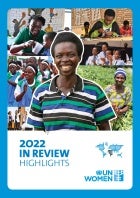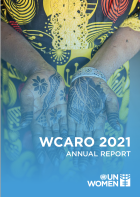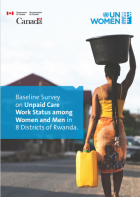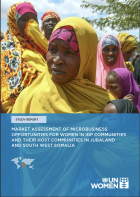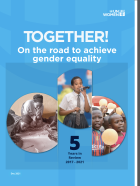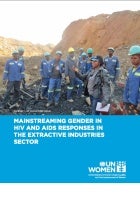1 - 13 of 13 Results
Date:
Discover the key insights and milestones of the Beijing Declaration and Platform for Action (BPfA) as we approach its 30th anniversary in 2025. This publication explores progress made, persistent challenges, and Kenya’s contributions to gender equality. Highlighting actionable steps for individuals and organizations, it connects the BPfA to the Sustainable Development Goals, emphasizing its continued relevance in driving transformative change for women and girls globally.
Date:
The care economy involves a wide range of paid and unpaid work activities for providing direct and indirect care for primarily care-dependent populations, such as children, older people, people with disabilities, and those who are ill. It also involves providing care for working individuals. A significant proportion of care work is unpaid, done in households by women and girls. Paid care work in social, domestic, and personal services, as well as in the education and health sectors, is predominantly the preserve of women.
Date:
This Policy Brief will explore the results of the mapping of the women’s movement, and the weaknesses, strengths and recommendations of the current civil-society movement as identified during the National Forum and analysis of the mapping.
Date:
The 2022 in review yearly edition aims at keeping our esteemed readers abreast with the endeavors of the UN Women Rwanda programmatic highlights and achievements throughout the year. It encompasses the period of January through December 2022. Within these pages, we have meticulously curated a selection of activities undertaken by our organization, as well as providing a platform for the voices of those whom we have had the privilege of serving, to be heard. We trust that the contents of this newsletter will prove to be both enlightening and informative. Enjoy the read!
Date:
2021 marked the end of the latest UN Women Strategic Plan, and during the year UN Women’s West and Central Africa Regional Office (WCARO) and Country Offices/Non-Resident Agencies continued to strengthen a comprehensive set of global norms, policies, and standards on gender equality and the empowerment of women; help end all forms of violence against women and girls; foster women’s economic empowerment; encourage and support women to lead; facilitate gender mainstreaming; and support women’s participation in peacebuilding and resilience efforts. Throughout the year, the COVID-19 pandemic continued to impact West and Central Africa, and women in the region were particularly vulnerable to the crisis.
Date:
The baseline survey on unpaid care work status among women and men in eight districts of Rwanda seeks to understand the care-related dynamics in households, this study utilized both quantitative and qualitative research methodologies. Drawing on Oxfam’s Household Care Survey (HCS) and the Harvard Analytical Framework (also referred to as the Gender Roles Framework). The survey helps to understand how women, men and children spend their time, how care activities are distributed in the household and the access that households have to basic public services and infrastructure that facilitate their everyday survival. The study also explored the social norms that shape power relations and gender division of care labor.
Date:
Empowering women in the economy and closing gender gaps in the workspace is key to achieving the 2030 Agenda for Sustainable Development and achieving the Sustainable Development Goals in Somalia. The host community landowners and IDP casual laborers can jointly build their skills in climate-smart agriculture that can benefit the productivity of farms whilst also building the knowledge and skill set of IDPs.
Date:
The five years in review publication captures the progress made from 2017 to 2021 across its different focus areas: Leadership and Political Participation, Women’s Economic Empowerment, Ending Violence Against Women, Data and Statistics, HIV/AIDS and the response to the unfolding crisis caused by the COVID-19 pandemic.
Date:
The UN Women WCARO annual report aims to share information about the regional office's activities on women empowerment and gender equality in 2020. The said year has been a particularly difficult year around the world with the COVID-19 pandemic. In West and Central Africa (WCA), women and girls were particularly vulnerable to the crisis. To counter these burdens and build medium and long- term recovery measures, the UN Women WCA Regional Office successfully provided multi-faceted assistance...
Date:
This Guideline for Gender Responsive Media published in two languages (Amharic and English) aims to inform and guide media houses, media practitioners, journalists, editors, and anyone in the media and communication sector about ethical reporting of issues related with gender and actions to take to create a gender sensitive media environment both within the media houses as well as in all the contents produced by the media houses
Date:
The Abridged version of the Perceptions Study on Social Norms in Malawi serves as an executive summary of the baseline study for the EVAW thematic component of the Women’s Empowerment Programme (WEP) 2018-2021. This study revealed various perceptions of social norms around VAWG in Malawi. Particularly, it shows how pervasive social norms support gender inequality and VAWG, including harmful practices. The study focused on five districts – Dedza, Karonga, Mangochi, Mzimba and Salima – in Malawi. This study can be used to inform policy dialogue and programme development, including where and how UN Women and its partners can implement behaviour change projects aimed at promoting favourable social norms and attitudes at community levels, and to formulate key messages for communication initiatives on women’s rights, gender equality and VAWG.
Date:
This study revealed various perceptions of social norms around VAWG in Malawi. Particularly, it shows how pervasive social norms support gender inequality and VAWG, including harmful practices. The study focused on five districts – Dedza, Karonga, Mangochi, Mzimba and Salima – in Malawi. This study can be used to inform policy dialogue and programme development, including where and how UN Women and its partners can implement behaviour change projects aimed at promoting favourable social norms and attitudes at community levels, and to formulate key messages for communication initiatives on women’s rights, gender equality and VAWG.
Date:
As part of this program UN Women have an ongoing initiative examining the gender dimensions of HIV and AIDS as they intersect with the extractive industries. This initiative has involved desk research and consultations with industry representatives, and has resulted in a two-part publication. The first part of the publication is a contextual background report, which examines the links between gender, HIV and AIDS and the extractive industries in more depth, including full citations and methodological information about the research process.




